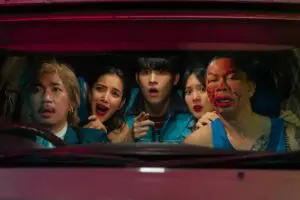I suppose it is somewhat ironic that North Korea’s fervent attempts to censor The Interview have did nothing but bolster the illusion of credibility surrounding it. What began as a single-minded, farcical middlebrow bromance comedy, became through no real fault of its own a representation of the most deeply-entrenched American values: patriotism, free speech, the perpetual war against terrorism; it’s director, Seth Rogan, his co-director, Evan Goldberg and his co-star, James Franco, were elevated to folk hero status; and a silly Hollywood movie has become an independent triumph, grossing $15 million over the holiday weekend through digital downloads alone, paving the way for new distribution models outside of widespread theatrical releases.
All this, and almost nobody mentioned how much the movie itself absolutely sucks.
Of course it doesn’t really matter either way, as at this stage whether The Interview works as a geopolitical satire or is even funny on its own terms has long since stopped being the point. From the hacking into Sony Pictures Entertainment to the threats of a 9/11-style unholy war against theatres showing the movie, to the subsequent cancellation of its release to the last-minute decision to distribute it after all to small movie theatres and via video-on-demand services, by simply allying itself with the Fifth Amendment The Interview cemented itself as something more than what it ever would have been otherwise. Every ticket sold, every $6 download, is a vote for America, for human rights, and against fascism.
It’s odd, because eventually we’re going to have to try and justify why this thing was a big deal independently of the scandal which surrounded it. And I don’t think we’re going to be able to. It isn’t nearly as funny, smart or cutting as it could’ve been. It’s just a movie about North Korea aimed squarely at the Franco/Rogen demographic. By the time a generation not yet born begins asking what all the fuss was about, that audience won’t even exist.

It doesn’t help that targeting 31-year-old dictator Kim Jong-un isn’t particularly bold or meaningful outside of the fact he’s a sitting foreign leader rather than an elaborate caricature of one. Going after North Korea as a whole is worthless; they’re not at war with the West [Note: I wrote this before 2017], and all the average American – or anyone, for that matter – even knows about the country pretty much begins and ends with Team America: World Police.
So, what’s the point of all this? When you divorce The Interview from the fiasco, what is it trying to say? Is it just another example of Rogen’s brazen commitment to following through on his own outlandish ideas? I honestly don’t know. What I do know is that if there’s a worthy film squatting somewhere within this overlong sequence of predictable gags and thoughtless geopolitical swiping, I certainly didn’t find it.
Anyway. The premise, as these things go, is reasonably clever: Franco plays dopey, egomaniacal talk-show host Dave Skylark and Rogen his long-suffering producer Aaron Rapoport; together they helm a credibility-starved, tabloid-centric cable chat show, Skylark Tonight, which finally finds some claim to legitimacy when North Korean dictator and huge fan of the show, Kim Jong-un, consents to an exclusive interview. Before they can be flown out to Pyongyang to conduct it, however, the pair is conscripted by the CIA to use the interview as a ruse in order to assassinate him.
The reason this setup works is that it allows Franco and Rogen ample opportunity to work through a series of spy movie tropes in their typical comedic double-act style, with Rogen playing the straight-man against Franco’s obnoxious, moronic Skylark. Once the plot moves to North Korea this dynamic is exacerbated, as Skylark becomes predictably enamoured with Kim Jong-un’s propaganda and Rapoport with his good-looking chief propagandist, Sook. This leads to a number of genuinely comical scenes of Dave and Kim hanging out together as Aaron is forced to endure a series of physical indignities and emotional traumas as he attempts to preserve the mission and their cover.

One of the stars hiding something uncomfortably large up their arse was funnier when Jonah Hill was doing it in Get Him to the Greek, but there are other moments which work well enough thanks almost entirely to the presence of Veep’s Randall Park as the dictator himself, and a scene-stealing Diana Bang as Sook – the soldier with a conscience deep in his regime. Of the leads, Rogen is unsurprisingly the most competent, while Franco is having so much fun in his role that it comes at the expense of the audience. His shtick gets old remarkably fast; that his unctuous on-camera persona is almost indistinguishable from his real-life self makes The Interview’s desperate third act attempts to inject his character with something resembling pathos a laughable slap in the face for the viewer.
Incongruities like this are a large part of the reason why The Interview has no real satirical teeth. The movie clearly doesn’t have enough faith in its individual gags or comedy as a whole to actually make the points it wants to make, so the tone, themes and even genre shift uncomfortably every few minutes – sometimes from one scene to another. Jokes flit back and forth between pleasing jabs at the notorious absurdity of the Kim family regime and lazy pawing at low-hanging fruit like homosexuality, dick jokes and the brazen appropriation of black culture. The physical comedy is at times quite enjoyably grounded and at others outright juvenile slapstick. Even in the pivotal interview scene itself – the closest things come to legitimacy – the movie it still unable to get out of its own way; rather than be content with the moralist thrill of the grand gotcha, it instead descends into a weirdly over-the-top action sequence with blood and violence aplenty but no razor’s-edge or meaning. Kim suffering an Indiana Jones-style face-melting is far less satisfying than the internationally-televised conversation just moments before, but The Interview doesn’t have the balls to follow that angle through without having someone s**t themselves or have their fingers chewed off.
Ultimately The Interview fails because it has no idea how to be the kind of singeing satirical comedy it wants. Its politics are the kind proliferated by the entertainment industry and pop-culture snarking; Rogen, Goldberg and Franco are swinging for the fences at the easiest target imaginable, and still missing. This isn’t like when Tarantino killed Hitler in Inglourious Basterds; the atrocities of the Kims are too local, too separate from Western culture. Their camera-ready, flamboyant oddness is too ripe for mocking, plus Parker and Stone already did it. Kim Jong-il is the villain in that, but it’s hard to tell the difference. Laughing at them isn’t clever or subversive – it’s easy.
The real-world stakes surrounding this movie, the farce encircling the farce, are the only things halting The Interview’s inexorable hurtling towards its true role as a late-night cable TV fixture. It’s an amusing curiosity at best, and a far cry from the geopolitical lightning rod its current stature would imply. Of course it has a right to be shown, and to be seen, whether Kim Jong-un can take a joke or not, and it will be hailed as a symbol of free speech all the same. But that doesn’t necessarily mean it deserves to be.



